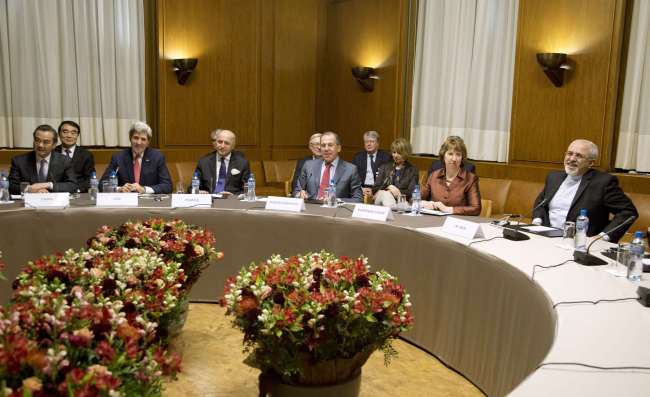'이란 핵협상' 극적 타결…이란 제재 일부 해제
이란-P5+1 협상 나흘만에 성사…자세한 합의내용 곧 공개
By KH디지털2Published : Nov. 24, 2013 - 14:31

이란 핵협상이 나흘간의 마라톤 회의 끝에 24일(현지시간) 극적으로 타결됐다.
이란과 유엔 안전보장이사회 5개 상임이사국 및 독일(P5+1)은 이날 이란 핵프로그램과 관련해 합의해 도달했다고 캐서린 애슈턴 유럽연합(EU) 외교안보 고위대표와 자바드 자리프 이란 외무장관 등이 공식 확인했다.
이번 합의는 10년간의 교착상태를 해소하기 위한 첫 단계로 풀이되고 있다.
협상과정을 잘 아는 복수의 소식통들에 따르면 이란이 제재 완화로 얻게될 경제적 가치는 향후 6개월 간 61억 달러다.
동결됐던 해외 자산 42억 달러를 회수할 수 있는 데다 그간 수출길이 막혔던 석유화학제품과 차량관련 품목 등 19억달러 어치를 다시 해외에 내다팔 수 있게 될 것으로 전망된다고 이들 관계자들은 전했다.
협상 당사국들은 그간 이란에 대한 유엔 안보리와 서방 국가들의 제재를 완화하는 대신 이란 핵프로그램을 규제하는 내용을 큰 틀로 협의를 벌여 왔다.
타결 소식은 P5+1 국가들과 이란 대표들이 협상 테이블에 앉은 지 나흘여 만에 나왔다.
P5+1 국가들은 협상과정에서 이란의 농축 우라늄 생산 금지 및 아라크 중수로 건설 중단을 요구해 왔으나 이런 제안이 핵주권을 주장하는 이란에 받아들여져 협정문에 담겼는지는 정확히 확인되지 않았다.
이란에서는 올해 8월 온건주의자로 알려진 하산 로하니 대통령이 취임한 뒤로 10년 이상 교착 상태를 보여온 서방 국가들과 핵협상이 어떤 형태로든 결실을 볼 것이라는 관측이 제기돼 왔다.
이란은 그간 자국 핵프로그램을 놓고 핵무기 개발을 의심해온 서방 국가들을 향해 평화적 목적의 핵개발에 불과하다는 입장을 설파해왔다.
핵협상을 타결한 당사국들은 이날 기자회견을 통해 상세한 합의내용을 밝힌다.
버락 오바마 미국 대통령도 이날 성명을 내 이란 핵협상 타결과 관련된 입장을 표명하기로 했다. (연합뉴스)
<관련 영문 기사>
Iran, world powers agree nuclear deal
GENEVA -- World powers Sunday agreed a landmark deal with Iran halting parts of its nuclear programme in what US President Barack Obama called "an important first step".
According to details of the accord agreed in Geneva provided by the White House, Iran has committed to halt uranium enrichment above purities of five percent.
In exchange the deal will afford the Islamic republic some $7 billion (5.2 billion euros) in sanctions relief and the powers promised to impose no new sanctions for six months if it sticks by the accord.
The announcement came after more than four days of talks in Geneva between Iran and the five permanent members of the UN Security Council members plus Germany.
British Foreign Secretary William Hague called it "good for the whole world, including Middle Eastern countries and the people of Iran themselves".
It was the third meeting in Geneva since Hassan Rouhani became Iranian president in August. The reputed moderate has raised hopes for an end to the decade-old standoff over Iran's nuclear work.
Numerous diplomatic initiatives have failed over the past 10 years to persuade Iran to rein in its programme, which Tehran insists is peaceful but which Western countries suspect is aimed at crafting atomic weapons.
Foreign ministers from the six powers including US Secretary of State John Kerry had jetted into Geneva for the second time in two weeks on Saturday morning after negotiators made good progress.
This "first phase" interim deal is meant to build trust and ease tensions while negotiators push on for a final accord to end once and for all fears that Tehran will acquire an atomic bomb.
It remains to be seen, however, whether the deal, once the details are known, with go down with hardliners in the United States and the Islamic republic, as well as Israel.
Iranians, many of whom see the nuclear programme as source of national pride, are impatient to see a lifting as soon as possible of sanctions that have more than halved Iran's vital oil exports since mid-2012.
Iran's currency, the rial, has been depreciated by more than half since late 2011, while inflation has soared to more than 40 percent, according to questionable official figures.
Many in Israel strongly believe that the only aim of Iran -- an ally of Hezbollah and embattled Syrian President Bashar al-Assad -- is to develop a nuclear arsenal.
Many hardliners in the United States agree, believing that Obama, who in September held an historic phone call with Rouhani, is being too soft on Iran.
As a result Obama will likely find it hard to persuade lawmakers to roll back any of the oil and financial sanctions and trade restrictions imposed by Congress.
Israel, itself widely assumed to be the Middle East's only nuclear-armed nation, has refused to rule out military action against its arch rival.
Israeli Prime Minister Benjamin Netanyahu has dismissed Rouhani's overtures to the international community as an empty charm offensive.
He has campaigned tirelessly against the mooted deal, believing that it still leaves Iran with the capability to make nuclear weapons. (AFP)








![[Graphic News] More Koreans say they plan long-distance trips this year](http://res.heraldm.com/phpwas/restmb_idxmake.php?idx=644&simg=/content/image/2024/04/17/20240417050828_0.gif&u=)
![[KH Explains] Hyundai's full hybrid edge to pay off amid slow transition to pure EVs](http://res.heraldm.com/phpwas/restmb_idxmake.php?idx=644&simg=/content/image/2024/04/18/20240418050645_0.jpg&u=20240419100350)







![[KH Explains] Hyundai's full hybrid edge to pay off amid slow transition to pure EVs](http://res.heraldm.com/phpwas/restmb_idxmake.php?idx=652&simg=/content/image/2024/04/18/20240418050645_0.jpg&u=20240419100350)

![[Today’s K-pop] Illit drops debut single remix](http://res.heraldm.com/phpwas/restmb_idxmake.php?idx=642&simg=/content/image/2024/04/19/20240419050612_0.jpg&u=)